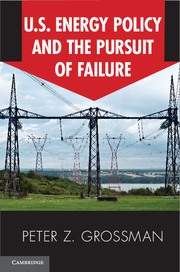3 - Fuels
Published online by Cambridge University Press: 05 March 2013
Summary
Oil experts, economists, and government officials who have attempted in recent years to predict the future demand and the prices of oil have had only marginally better success than those who foretell the advent of earthquakes or the second coming of the Messiah.
– James E. Akins (1973, 462; after saying this, Akins made several predictions, most of which were wrong)Introduction
Until the 1970s, there was no national program that could be termed an “energy policy” (Clark 1987). Arguably, until around 1970, there was no such thing as energy policy as a socioeconomic, political construct. There were, to be sure, policies related to production of various energy resources. The general heading for these policies was “fuels.”
For most of the first seven decades of the twentieth century, government intervention in fuel markets was justified at least implicitly by market failure. One of the earliest concerns was related to national defense, that is, a market failure due to a public goods problem. Military fuel needs will vary but will be paramount in the event of war, and military planners thought it imperative that resources be left in the ground or otherwise kept in storage to be available in the event of a national military emergency. Because there is no particular incentive for private producers to save resources today as insurance for such a contingency, the argument was that government needed to have direct control over at least some fuel resources. No doubt there was truth to the proposition that a modern armed force needed fuels, and not surprisingly, national defense energy issues came to the surface most strongly during and after both World Wars.
- Type
- Chapter
- Information
- US Energy Policy and the Pursuit of Failure , pp. 67 - 124Publisher: Cambridge University PressPrint publication year: 2013

